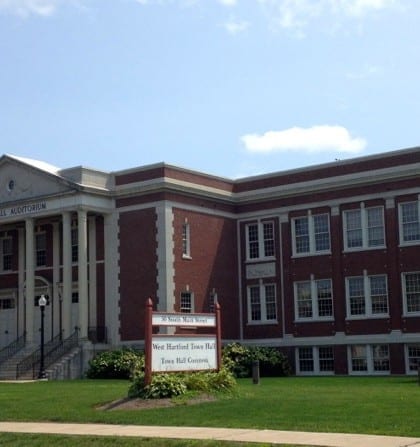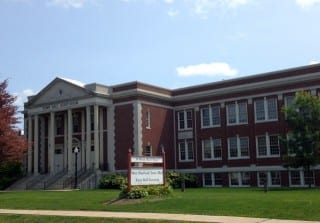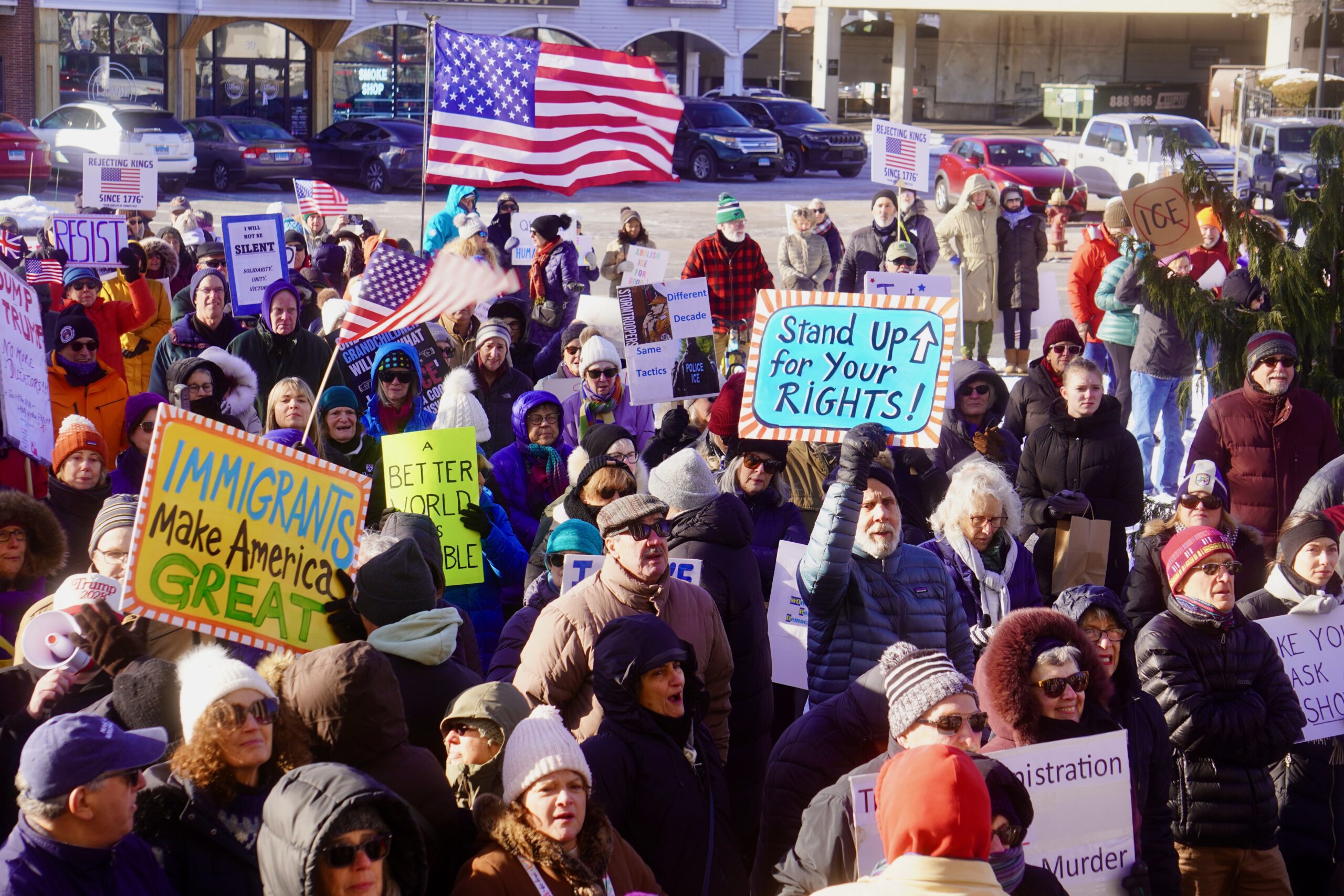West Hartford Town Council Adopts 2.5 Percent Budget Increase

Audio By Carbonatix

West Hartford Town Hall. Photo credit: Ronni Newton
West Hartford’s total General Fund budget for next fiscal year will be $257.5 million.

West Hartford Town Hall. Photo credit: Ronni Newton
By Ronni Newton
The West Hartford Town Council approved a $257.5 budget for the 2015-2016 fiscal year on Monday night in a roll call vote that was 6-3 along party lines.
The adopted budget is an increase of $6.2 million (2.5 percent) over the previous years budget, but is about $2 million less than the original numbers detailed on March 10 by Director of Financial Services Peter Privitera.
The reductions come from energy savings and negotiated electricity costs for both the town and the school system, and transfer of some new equipment purchases from the General Fund to the Capital Non-Recurring Expense Budget. Cuts were also made to risk management and estimated health expenses, Privitera said.
The mill rate will increase from 37.37 to 38.31, an increase of 2.5 percent which translates into $209 per year for the “average” West Hartford homeowner who owns a home valued at $319,000 and assessed at $223,000 (70 percent of market value).
The Board of Education passed its $148.4 million budget on April 7. The Board of Education’s budget, which increased by a 30-year-low of 1.7 percent, represents 58 percent of the town’s General Fund Budget.
Deputy Mayor Shari Cantor said that the budget is more than just a collection of numbers. It “focuses on our priorities, meets our obligations, and continues to strengthen us for the future,” she said. It serves as a “policy document, financial plan, operations guide, and a communications device.”
Cantor praised the work not only of the Town Council and Town Manager and his staff in putting together the budget, but also the work of all who find ways to be creative with their jobs, finding efficiencies in plowing our roads or raising funds to keep programs vibrant, keeping excellence in schools even as the per pupil cost drops to one of the the lowest in the state and we continue to face an ECS underfunding that is “unsustainable.”
“This budget is a fiscally sound, prudent, responsible and balanced budget that reflects our commitment to public safety, education, infrastructure, and quality of life that makes West Hartford a desirable place to live, work and play, to invest and reinvest,” Cantor said.
Council member Leon Davidoff commended the Board of Education for adopting an “excellent” budget with less than 2 percent increase. The overall budget, Davidoff said, “accurately reflects our community’s priorities.”
Minority leader Denise Hall said her vote against the budget is symbolic, but “stems from the fact that I have no control over the major drivers of this budget.”
“Frankly, I don’t want to make any cuts to the budget. I’d like to spend more on our infrastructure, fixing the streets, the potholes, the sidewalks, and the bridges. For too long we have put off investment in town assets in the effort to offset tax increases from unsustainable employment, pension and health care benefits,” Hall said.
ECS underfunding, unfunded state mandates, and “prevailing wage” requirements that increase the cost of town projects are among the items which Hall said are out of the town’s control and need to be addressed on the state level.
“Until residents demand change from their legislators or elect representatives who are willing to make the changes, no matter how much this council agrees on issues, we will not have the power to direct the town’s finances,” Hall said.
Council member Judy Casperson said that since the council has to vote on the budget without knowing what West Hartford will get from the state, the focus needs to be on what can be controlled, and what we do to maintain and grow the town’s resources. “At the end of the day, West Hartford is one of those places I dreamed of living when I was growing up in Colorado … I think we’re making very thoughtful decisions about what we can control.”
“I think 2.5 percent is a great number, but I also think that for the things we do control we have done nothing short of a remarkable job,” Clare Kindall said. Kindall also praised the “amazing vision” people have in and for West Hartford and said she looks forward to what will be done with the 56 acres that comprise the UConn Greater Hartford campus as well as development in the CTFastrak corridor.
Republican council member Chris Barnes said he planned to vote against the budget because he sees it as a “road map leading us in the wrong direction.”
“This budget is a maintenance budget, no new policies or programs – a $6.2 million increase simply to maintain what we have,” Barnes said. “This is a very dangerous trend that we face – higher taxes and higher budgets will catch up with us. At some point the property taxes will get too high and will negatively impact property values,” Barnes said.
Council member Harry Captain said that although raising taxes isn’t easy, the increase is reasonable and responsible, and much less than the percentage increase for other typical household expenditures. Captain said that he just spent more than the average increase on a trip to the dentist and grocery store.
“This is West Hartford. We are a high service community and that’s what the voters have voted for year, after year, after year, after decade, and it’s made our community what it is,” Captain said.
Republican Burke Doar said he would vote against the budget because it’s getting too expensive for many people to live in West Hartford and we need to continue to attract a diverse population, not just those who can afford it.
“I continue to believe that I would rather see no tax increases and less services than tax increases and the same services,” Doar said. “Eighty-seven percent of the budget comes from property taxes, and what do we see – fabulous entrepreneurs and developers coming in and wanting to invest. But the Grand List grows and it doesn’t grow enough to offset the need to increase taxes because we’ve got these costs that are out of our control. What do we do – just say they’re out of control or make some changes,” Doar said.
Mayor Scott Slifka, who spoke last, said that he hates the political side of budget night which is often so “polarizing” and not necessarily reflective of how well the Town Council typically works together.
“This year perhaps more than ever our budget is affected by what we all agree is most challenging,” Slifka said. ECS is that “financial albatross,” said Slifka, but because it’s so complicated people tend to tune out. Slifka said that this year, thanks to the leadership of State Sen. Beth Bye and recent legislation she has proposed, he is hopeful that West Hartford will “see some progress in the right direction.”
While no budget is ever perfect, Slifka said, this one is free of gimmicks and answers what he considers to be the five most important questions: “Are we keeping you safe? Are we educating your kids? Are you getting value for your home and tax dollar? Is there an environment for economic development? Are we creating a responsible legacy?” The answer to all, Slifka said, is “yes.”
Click here to access all available budget documents on the Town of West Hartford website.
Like what you see here? Click here to subscribe to We-Ha’s newsletter so you’ll always be in the know about what’s happening in West Hartford!



